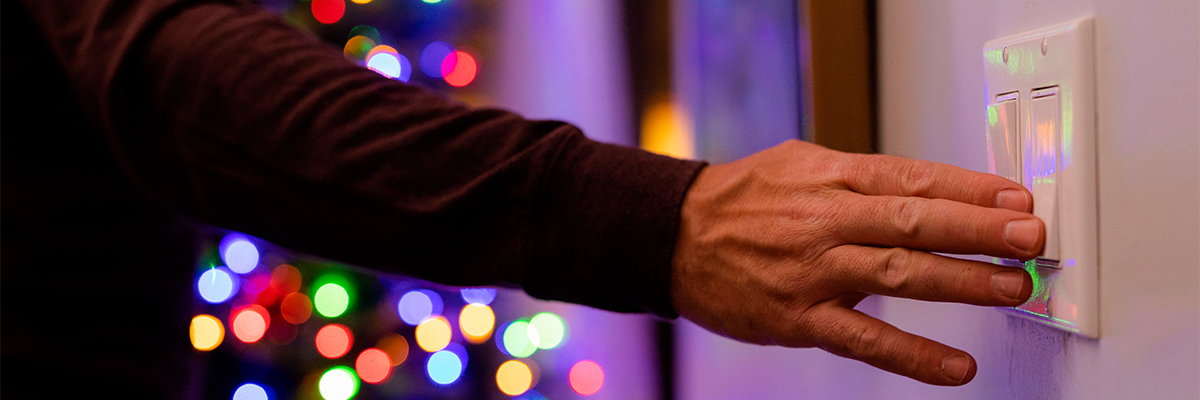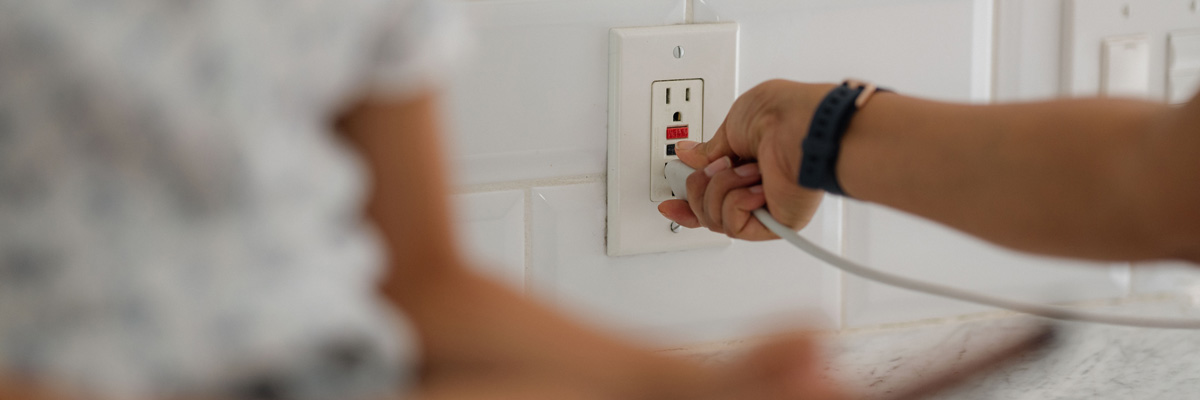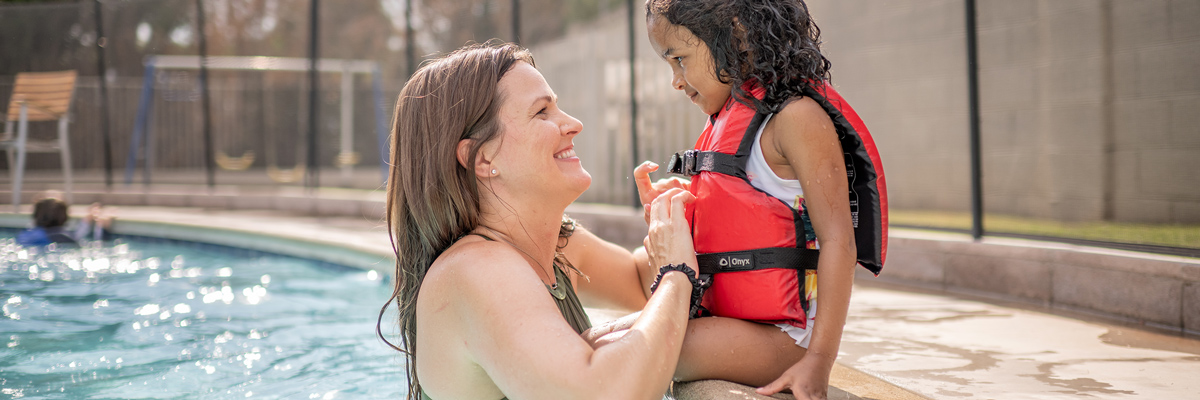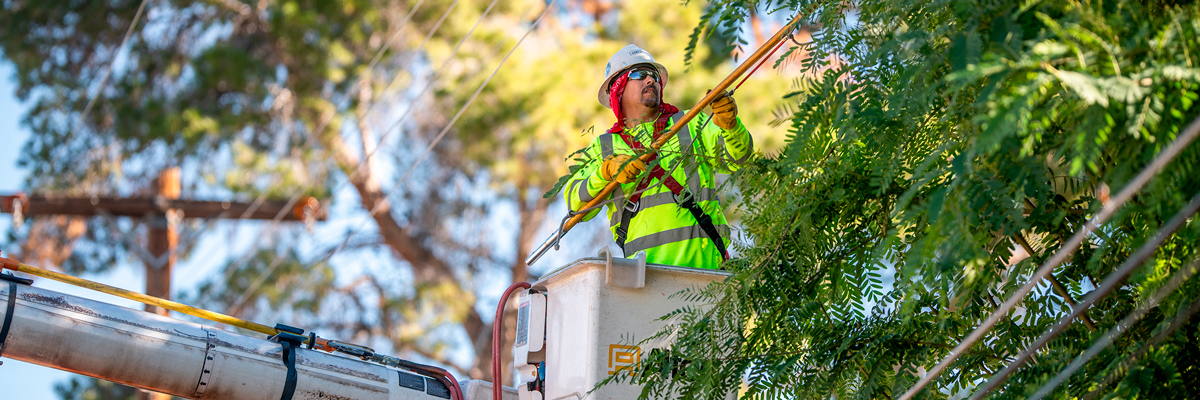
Electrical safety tips for home and work
Electricity enhances our lives in many ways, but it can also present risks in your home and workplace.
On this page:
Holiday lights
The glow of holiday lights makes the season merry and bright, but lights also come with risks we all need to keep in mind.
Follow these tips to help keep your holidays joyous and danger-free.
Check lights for broken or cracked sockets, loose connections and frayed or bare wires. If a string of lights or a cord is damaged, throw it away. |
|
Unplug all holiday lights before leaving home or going to bed. Using an indoor/outdoor automatic timer can ensure lights aren’t left on by mistake. |
|
Make sure that lights are unplugged before adjusting them on a house or a tree. |
|
Only buy artificial trees that are labeled “flame resistant.” |
|
Watch children around holiday lights and decorations. Small pieces can be swallowed. |
|
Use LED holiday lights. They’re energy efficient and don’t get hot to the touch. Save on LED bulbs when you shop on SRP Marketplace. |
|
Don’t let bulbs rest on tree limbs or branches. Instead, clip or tie them into place. |
Power lines
Thousands of miles of power lines deliver electricity to your home and workplace. However, these lines can present safety hazards if anything or anyone comes into contact with them.
Follow these tips to stay safe near overhead and underground power lines:
Stay up to date on the forecast and secure outdoor items before a storm to keep them from getting entangled in the lines. |
|
Store any pool toys and inflatables when not in use. |
|
Remove any flags or outdoor signs when the wind kicks up. |
|
Call 811 or visit arizona811.com |
|
Trim trees to prevent contact with power lines. |
|
Never release balloons into the air. |

Cords and outlets
Extension cords and outlets provide convenient ways to plug in and power up your electrical devices. However, if misused, they can become a hazard for electric shock, tripping and even fires.
Here are some guidelines to keep your home, your workplace and yourself safe:
Use certified extension cords like those approved by Underwriters Laboratories. (Look for “UL listed” on certified cords.) |
|
Replace old cords and outlet covers. |
|
Only use two-pronged extension cords indoors. Three-pronged (grounded) cords are safe for indoor and outdoor use. |
|
Replace cords that show signs of fraying or wear, especially at the plug or connection point. |
|
Before plugging in an appliance, tool or electronic device, make sure the switch is off. |
|
When unplugging something, be sure to pull the plug – not the cord. |
|
Keep children safe by installing socket guards on outlets that aren’t being used. |
|
Follow all wattage ratings for cords. The rating on the cord should be sufficient for the wattage of the item being plugged in. If an item has no wattage rating, multiply the number of amps by 125.. |
|
Keep water away from cords and electrical outlets at all times. |
|
Ground fault circuit interrupter (GFCI) outlets should be installed near sources of water such as bathrooms, kitchens and garages. |
|
Don’t overload outlets or surge protectors by plugging in too many cords. |
|
Don’t drape electrical cords or wires over radiators, pipes or metal objects.. |
|
Never cut off the third prong of a three-pronged plug. This prong grounds appliances for safe use. |
|
Never run an extension cord under rugs or carpeting or in high-traffic areas. |
|
Don’t twist, bind or crush cords. |
Fuses and circuit breakers
Fuses and circuit breakers are important safety devices. They protect appliances and electrical circuits from damage if there’s a power surge or outage. However, if you don’t know how to manage them, they can lead to more damage than they will prevent.
Follow these five tips to safely maintain your fuses and circuit breakers at work and home:
Make sure you know where the main breaker (electric switch) is located and how to turn it on and off. |
|
Make sure that circuit breakers are properly labeled. |
|
If a circuit breaker or fuse blows, find out the cause to prevent it from happening again. |
|
Get familiar with the proper fuse ratings for your electrical circuits. |
|
Don’t overload circuits with too many plugs. |
Teach kids about electrical safety with our free learning materials.
Appliances
Whether they’re styling your hair, warming up a room or making a cup of coffee, appliances in your home and your workplace make life easier. But if you operate them unsafely, they could become hazardous.
Use these tips to protect your large and small appliances and prevent accidents:
Always unplug hair dryers, electric shavers and personal care devices when children are in the bathroom. |
|
If an appliance falls into a sink or bathtub, unplug it immediately. Never try to pull an electronic appliance out of water while it is plugged in. Even if a device is turned off, if it’s plugged in, electricity is flowing through it. |
|
Check that the Underwriters Laboratories (UL) approval applies to the entire appliance, not just the plug or cord. |
|
Unplug small electronics and appliances when you aren’t using them. This will keep devices from turning on or short circuiting if there’s a voltage surge. |
|
Never use an extension cord with a high-wattage appliance, such as an air conditioner, portable electric heater or iron. |
|
Don’t leave appliances plugged in near sinks or tubs. |


